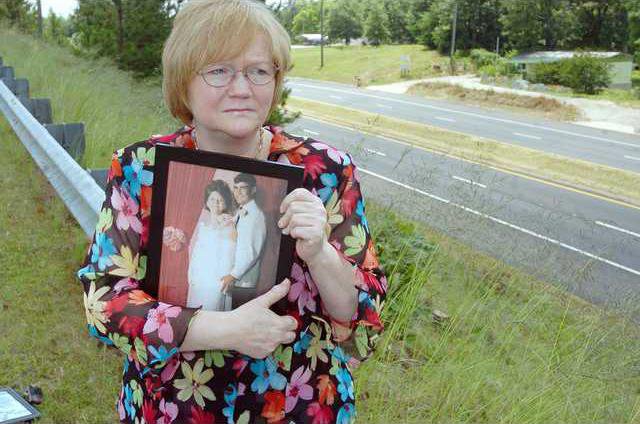A year has passed since Dianne Satterfield’s husband was killed when his car struck a horse wandering in the road, and despite all her efforts, she is no closer to getting the answers she seeks.
Satterfield has made it her mission to identify the owner of the chestnut gelding that caused the predawn crash on U.S. 129 just south of Gainesville on May 28, 2009. She also wants to see stricter requirements and accountability for animal owners and a better process of identifying them in the event of an accident.
“Some way there needs to be something done,” she said. “I want to make sure this doesn’t happen to someone else, because right now it’s definitely a possibility.”
George David Satterfield, 56, was on his way to work shortly before 6 a.m. when the crash occurred near the intersection of Gaines Mill Road.
Satterfield lived with his wife of 39 years in the Madison County town of Comer and worked for a food wholesaler, making a
regular round of stops at convenience stores in a region that included Gainesville.
It was foggy that morning, and officials believe Satterfield never saw the horse in the northbound lanes of the road before he struck it with his Nissan Sentra. The horse went through the windshield and into Satterfield’s car, killing him instantly. The horse was struck by another car and also died.
Since then, no one has come forward to claim the horse, and residents along Gaines Mill Road have denied owning it.
“We’ve talked to people in the neighborhood, I’ve talked to farriers in the community, I’ve talked to veterinarians,” said Lt. Tharon Dukes, the Georgia State Patrol’s statewide commander of its Specialized Collision Reconstruction Teams.
“I’ve tried any possible avenue to find someone who’s seen the horse, dealt with the horse or knows of the horse. Just about every lead I’ve had has turned into a dead end.”
Dukes, who is based out of Athens, took on the case in February after Satterfield compiled a report that reached the Georgia Board of Public Safety.
Dukes took the names Satterfield collected through her own investigation and followed through, but has not found anything promising.
“Right now I’m not going to say the case is closed,” Dukes said. “It has slowed dramatically since I first started on it. I’ve just about exhausted all the leads I’ve had. Nobody’s willing to step up and do the honorable thing and claim responsibility, or at least ownership of the horse.”
The horse looked to be a thoroughbred that was most likely raced at one time, Dukes said. It had white “sock” markings on three of its feet and a white “blaze” mark down the forehead.
Dianne Satterfield said her own research has revealed that in Hall County, loose horses are a recurring problem.
Through open records requests, she found records of six 911 calls reporting horses loose in the five days before and after her husband’s fatal crash. The day after the accident, someone called 911 to report two horses loose near Eberhart Cemetery Road, two miles from the scene of the crash.
Satterfield has also found records of at least five horse-car wrecks in Hall County in the past five years. Her husband’s was the only fatal wreck.
Satterfield said a ride along Gaines Mill Road reveals serious problems with subpar fencing, and in some parts of the county, horses aren’t even confined by fences.
A proposal made last year by animal control officials to make stricter standards for fencing in the county’s ordinances did not come to pass after farmers complained it would be burdensome and is already addressed by state law.
Satterfield said horses also need to be easier to identify.
The horse that David Satterfield struck had a numeric tattoo on the inside of its lip, but the officials have been unable to identify the owner through the tattoo.
Satterfield believes horse owners should be required by law to have microchips implanted in their animals, much as is already done with pet dogs and cats.
If the owner is ever identified, officials are unsure what charges will be brought. Gainesville State Patrol Post Commander Sgt. Dean Allen said troopers would likely consult with the Hall County solicitor’s office.
Hall County Solicitor-General Stephanie Woodard said the charges could range from violation of animal control ordinances to reckless conduct, if a pattern of animals repeatedly getting loose could be shown. The charges might even rise to felony-level criminal neglect, Woodard said.“Certainly there could be civil liability,” Woodard said.
On Friday, the one-year anniversary of David Satterfield’s death, his widow visited the scene of the crash and repeated her belief that the horse’s owner likely lived nearby.
“Somebody knows whose horse it is,” she said. “Somebody knows their horse didn’t come home that night. I just want to know the rest of the story.”
Anyone with information is asked to call 770-538-2740.

